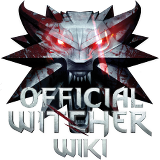 |

|
 |

|
Scientific progress requires sacrifice. No one knows this better than the victims of mutants, beastly creatures bred using mutagens. Mutants are a step toward the creation of a superhuman; their makers can assume the experiment is progressing nicely given the beasts' strength, resistance, and cruelty.
Among known mutants there are the witchers and (possibly) the girls born under the Black Sun, including Renfri.
see also:
Monsterbook[ | ]
Developer CD Projekt's characterization of the mutant taken from the monsterbook, which was enclosed with the Collectors Edition of the computer game The Witcher for Poland, Hungary and the Czech Republic:
A fast, agile, and cunning opponent — such is the mutant, a result of the first series of experiments conducted on humans by the Order of the Flaming Rose. It is not yet a perfect weapon, but the mutant provides excellent support to the Order's heavily armoured forces.
For the Order, this creature is a sort of test, a prelude to the proper experiment that leads to the creation of the perfect warrior. This monster had to look like an abortive prototype. The exposed bones of the chest, missing skin, and strongly deformed face suggest that the experimenters did not have full control of the deformations. Bony crests on the beast's back, head and forearms indicate that the genes of a monster were used in the mutation. The detailed sketch depicts the mutant's head, its muscle layers in disarray after shrinking, tearing, and shifting during the mutation.
The creature's feet are an intriguing anatomical detail. They are, in fact, another pair of hands that render the mutant similar to a monkey. With four hands, the mutant easily climbs trees and jumps from limb to limb in a bid to escape or to await its foes in ambush.
| “ | On the third day all the children died save one, a male barely ten. Hitherto agitated by a sudden madness, he fall at al once into a stupor. His eyes took on a glassy gaze; incessantly with his hands did he clutch at clothing, or brandish then in the air as if desirous of catching a quill. His breathing grew loud and hoarse; sweat cold, clammy and malodorous appeared on his skin. Then was he once more given elixir through the vein and the seizure it did return. This time a nose-bleed did ensue, coughing turned to vomiting, after which the male weakened entirely and became inert.
For tow days more did symptoms not subside. The child's skin, hitherto drenched in sweat, grew dry and hot, the pulse ceased to be full and firm — albeit remaining of average strength, slow rather than fast. No more did he awake, nor did he scream. Finally, come the seventh day. The male awake and opened his eyes, and his eyes were as those of a viper. |
” |
— pg. 77,
Το Αίμα των Ξωτικών (UK edition)
| ||



